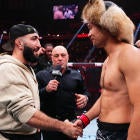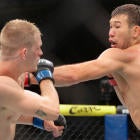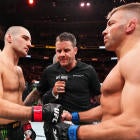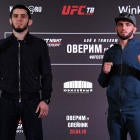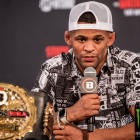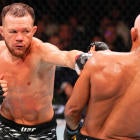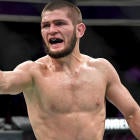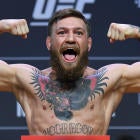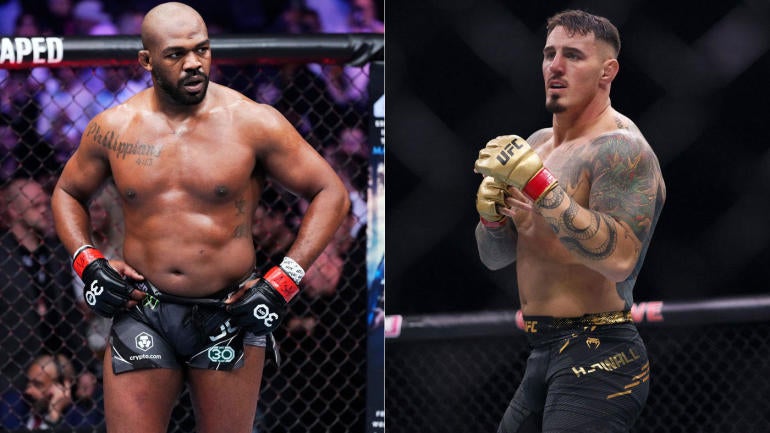
Despite its history of being a hit-or-miss division at any given point based upon the star power and depth (or the lack thereof), heavyweight is hot at the moment for the UFC.
No, former champion Francis Ngannou is not walking through that door following his exit from the promotion to both PFL and professional boxing. But a potential generational matchup is on the horizon between heavyweight champion Jon Jones, who doubles as the sport's G.O.A.T., and rising interim titleholder Tom Aspinall.
Whether or not you believe the fight will end up happening in 2025 after Jones (finally) returns from injury to face 42-year-old former champ Stipe Miocic in November, both fans and media alike can't stop debating about the possibility of it and whether Jones, 37, will follow through on his teases of imminent retirement before such a can't-miss heavyweight summit might take place.
But before you take sides as to who is right or wrong in this ongoing soap opera, let's take a closer look at five things to consider about the Jones-Aspinall situation.
1. Jon Jones' retirement threats have more to do with fighter pay than fear
Even though UFC CEO Dana White's effusive praise for Jones of late has felt almost comical, he isn't wrong when he points out the former light heavyweight king's history of showing no fear in the face of whatever scary challenge is in front of him inside the Octagon. And Jones, whose only career defeat came via disqualification in 2009 (and deserves to be overturned given the recent rule changes for 12-to-6 elbows), has plenty of reason to be confident as someone who holds, quite possibly, the most impressive resume in the sport's history. A cynic of Jones wouldn't be wrong to point out that his recent three-year layoff from the sport coincided perfectly with Ngannou's championship reign (and that Jones didn't return to the Octagon until Ngannou fought out his UFC deal). That certainly needs to be considered in this debate. But the onus upon Jones' initial exit from regular competition, which led directly to his vacating of the 205-pound title in 2020 to announce an eventual move to heavyweight, was about fighter pay and Jones' wish to be compensated what he called "Deontay Wilder money" ($25-30 million) for taking on such a dangerous risk of moving up in weight.
To be fair, Jones deserves to be heavily overpaid, even with his constant outside-the-cage issues, for how great of a career he has had and how long he has been a consistent pay-per-view headliner (dating back to 2011) for the company. Jones remains the closest thing UFC has ever had to a Tiger Woods level phenom. And if the sport's G.O.A.T. can't be overpaid for a fight as huge as the Aspinall clash has the potential to be, who can? While Jones' retirement teases and constant dismissals of Aspinall aren't the preferred response that any fan wants to hear, don't look past how important it is for Jones to keep up this front as a means for public negotiating with the UFC in order to retain as much leverage as possible should he defeat Miocic and the fight with Aspinall truly come to fruition. If the UFC really wants Jones-Aspinall, they are going to have to pay for it. And given the promotion's year over year records of financial success, Jones deserves that.
There are fighters literally all over the world that think in the back of their mind I can beat Jon Jones. There will be no statues of you. Go out and win more, make your name greater, that is the only way you do it.
— BONY (@JonnyBones) August 20, 2024
2. Tom Aspinall's social media campaigns are increasing the pressure upon Jones
At 6-foot-5 with the hand speed of a middleweight, the 31-year-old Aspinall has all the makings to advance our expectations of how athletic and skillful a modern-day UFC heavyweight can be. But if he doesn't get a chance to go through a legend with both historical relevancy and star power (like Jones, Miocic or Ngannou), it's fair to argue how much casual and crossover fans will actually care given how quickly the division's roster levels out after those big names. Because of that, a strong argument can be made that Aspinall not only needs Jones but that he has been making all the right moves of late by taking to social media and so aggressively challenging Jones' manhood (including falsely teasing that Miocic is hurt and Jones needs a new opponent). This is the right move when it comes to further swaying the court of public opinion among fans. But it's even more valuable due to the promotional pressure that Aspinall's words have put on Jones of late simply because White is being constantly asked about it (which has led to him repeatedly saying that he expects Jones-Aspinall to happen). Even if Jones enters the Octagon at UFC 309 in November with plans on never fighting again, it will be up to Aspinall to show up cageside and do his part to create some sort of viral moment that makes it so Jones has no other choice should he defeat Miocic but to unify the title and silence the noise from his critics.
3. It's interesting how Georges St-Pierre gets a free pass and Jones doesn't
This, of course, might simply come down to likeability among the fanbase as GSP remains almost universally beloved while Jones, who has had his share of dust ups and issues with the law, is as polarizing an individual as any champion in UFC history. But the facts are the facts as we continue to deal with the potential of Jones' retirement. And St-Pierre, after returning from a four-year retirement in 2017 to capture a second UFC title by dramatically submitting Michael Bisping for the middleweight crown, was faced with a similar predicament. According to White, GSP signed a deal to fight Bisping (who, despite being champion, was looked at as being past his prime, not dissimilar to Miocic) under the auspices that he would defend the 185-pound title against the next in line, Robert Whittaker (who, like Aspinall, was the interim titleholder), should he be victorious. Despite what he told White, St-Pierre never had any intention of remaining active following the Bisping fight and his subsequent retirement is barely ever mentioned under a negative light. The parallels between Jones and GSP, in this case, simply can't be ignored.
4. Aspinall's recent evolution has quickly removed the need for Jones-Ngannou
In a perfect world, would Jones and Ngannou have already fought to keep a perfect heavyweight lineage alive? Without question. But Ngannou has been anything but active as an MMA fighter since his last UFC appearance in January 2022. Although Ngannou plans on snapping a 33-month MMA layoff when he makes his PFL debut in October after two fights in boxing, very few are still talking about the possibility of whether UFC would ever consider a cross-promotional fight. And a big part of that reason has been Aspinall's ascension ever since Ngannou stepped away. Even with the disastrous knee injury Aspinall suffered 15 seconds into his TKO loss to Curtis Blaydes in 2022 (in his lone UFC defeat) and the one-year layoff to recover that followed, it has been Aspinall who has been the talk of the division for much of the past two years. Not only has Aspinall finished every single opponent across 15 pro wins, he has still never fought beyond the second round. And the four-pack of first-round finishes he has assembled since Ngannou left the UFC is incredibly impressive as Aspinall has taken out Alexander Volkov, Marcin Tybura, Sergei Pavlovich and Blaydes (in their rematch). There's no doubt that Jones-Ngannou is a matchup that offers more star power. But Aspinall has made it so him subbing in is just as important in the sense of defining, right now, who is the best heavyweight in the world.
TOM ASPINALL RETAINS THE INTERIM TITLE IN THE FIRST ROUND 🔥 #UFC304 pic.twitter.com/fRvfilgpeU
— SportsCenter (@SportsCenter) July 28, 2024
5. If any UFC fight demands the dome or outdoor stadium treatment, it's Jones-Aspinall
White has long been hesitant to move UFC from basketball and hockey arenas to the much bigger showcase venues, like AT&T Stadium in Texas or Las Vegas' new Allegiant Stadium, due to sight lines and customer experience. But stadium fights similar to GSP's 2011 win over Jake Shields at Toronto's Rogers Centre or Holly Holm's 2015 upset of Ronda Rousey at Australia's Marvel Stadium have become cultural moments of sporting history lore in their respective markets. Can you imagine how big a fight like Jones-Aspinall would feel in an English soccer stadium, similar to how heavyweight boxer Anthony Joshua regularly fills stadiums to the size of 90,000 for his biggest nights. Nothing is bigger in combat sports than a generational heavyweight fight and UFC, should it prove able to make it, needs to pull out all of the stops to make it as big as possible.









